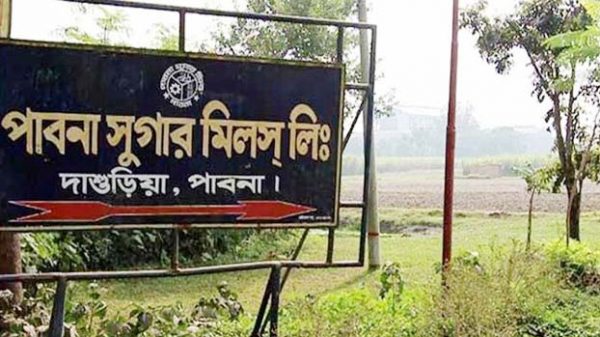The government is on the way to close all the loss-making factories
- Update Time : Wednesday, December 23, 2020

FBD Desk:
The government has closed all state-owned jute mills. Several sugar mills have also been shut down, with plans to close more. The jute and sugar mills have been running at a loss for a long time and the government has stopped them. Not only these jute and sugar mills, the government will gradually shut down all kinds of loss-making state-owned enterprises and give opportunities to the private sector there.However, the government will keep the profitable institutions active. At the same time, the government will continue to invest in institutions like arms factories which cannot be given to the private sector or private companies cannot come. The government is moving forward with such a plan. The eighth five-year plan is being made in that light. That is why the eighth five-year plan is being made by increasing private sector investment by 61 percent and public sector investment by 19 percent.
Member of the General Economics Department (Senior Secretary) said. Shamsul Alam said this information. He said this while presenting the keynote address at the seminar on ‘Development Planning Experiences in Bangladesh (Following a Planned Path of Growth with a Vision)’ organized by the Department of Legislative and Parliamentary Affairs at the Center for Integrated Rural Development in Asia and the Pacific (CIRDAP). On the way It will be taken up at the meeting of the Executive Committee of the National Economic Council (ECNEC) after Prime Minister Sheikh Hasina sees it. The General Economics Department of the Ministry of Planning is preparing this eighth five-year plan.
Some experts say state-run loss-making factories will be shut down to cheat the public. Because these losses are not due to workers; Either mainly due to administration looting and corruption. If the organization closes, the workers will have to suffer the consequences, they will become unemployed. At the same time, the minimum wage created in the public sector will not be effective. This is clearly anti-people policy.
Presenting the keynote address at the seminar on the closure of loss-making state-owned enterprises, Shamsul Alam said, “I don’t think the government is leaving any for-profit institution. If it is profitable, the government will be able to run it. However, the private sector could have made more profit. However, if it is profitable, the government will remain. This is our policy. But the government will give up the deficits year after year. This is what we have openly stated in the Plan (Eighth Five Year Plan). Loss trekking (loss-making factories) cannot be sustained with people’s tax money.
‘This document (Eighth Five Year Plan) is basically a political document (it is a political document). It is making political government documents. This is not Shamsul Alam’s document ‘, he said.
Shamsul Alam said, “Even then, the state will continue to run those industries which cannot or will not come to the private sector.” For example, the state used to generate electricity in this country, because the private sector would not come with such a large investment. Now comes the private sector. Education was a commodity. So education is now coming to the private sector. The private sector must do what it can. The government will do the same for factories, like arms factories. It must be in the hands of the state. Because when the arms go to the private sector, when does the arms go to whom?
Mentioning that the country will move towards a free economy as before, he said, “The eighth five-year period is nearing its end. I emphasized the free economy in the Seventh Five-Year Plan, this time even more. This time 81 percent will come from private investment. I said 6 percent investment in the Seventh Five Year Plan. That means we are slowly moving towards a world economy. We are emphasizing on more exports.
Commenting on the eighth five-year plan, the private sector will be kept in the main driving seat, Shamsul Alam said, “The private sector will spend 61 percent, the government’s 19 percent is very important. Because he will give good governance, there will be freedom to invest, it is the responsibility of the state to protect it – that is what the government will do. If I buy a bungalow, no one will occupy it, if I acquire property, no one will take it – it will guarantee the state. Where the private sector will not come to the infrastructure, the government will do it. Therefore, the eighth five-year plan will be more market-oriented.
The member of the general economics department also said that there was no need to keep the jute and sugar in short supply.
He said, ‘Today the jute mill is run by the government, it is run by force. But the salary of a jute mill worker is 900 rupees. And when he went to Rangpur, he saw that the salary of a jute mill worker was 400 rupees. How can the government do it?
Citing more examples, Shamsul Alam said, ‘Will the government run the shipping or not? From 29 ships we have now landed at 8 o’clock. Even then I bought 3 hours 5 months ago. After a few years they will say give two more, then we can do business. So this business is a waste of people’s money. ‘
He said, ‘Cement was in the state sector. Now cement can be exported. Does the government need to run a cement factory now? ‘
Shamsul Alam expressed his personal opinion about the aircraft and said, ‘Does flying have any meaning? Is there Italian Airlines Alitalia now? The United States government had a well-known airline, but it is no more. So the government must not keep, which is going to deficit. Because it wastes people’s tax money. The government will keep what is going on successfully. There is no difficulty in keeping it.
The government’s decision to close the loss factory welcomed the Executive Director of the Center for Policy Dialogue (CPD). Fahmida Khatun. “I think it’s on the right track,” he told. When the government goes to do business, it floats there, all kinds of corruption are wasted. It has been going on for ages. Again there is inefficiency. And once I got a job, I will never get a job again – whether we work or not, these are the things we see.
Dr. Fahmida Khatun said non-profit organizations must be shut down and the private sector must be brought forward. Private sector investment must be increased. If private sector investment does not increase, employment will not increase. There is no opportunity for government subsidy or charity by investing in non-profit organizations. Instead, invest that money in the education sector for the welfare of the people, more schools-colleges, hospitals-these are Banak. That should be done. And leave it to the private sector. They should be encouraged to simplify the policy so that the private sector can do business well.
However, leftist political parties and organizations hold regular rallies, processions and human chains to protest the closure of state-owned jute and sugar mills. They are strongly opposed to the closure of state-owned non-profit or loss-making institutions.
In this regard, the coordinator of the Left Democratic Alliance, Jonaid Saki, told, “Various factories in the public sector are at a loss. This loss is mainly due to heavy administration, looting and corruption. In that case, if the loss sector has to be stopped, the government itself needs to be stopped first. If the government is shut down, the loss-making sector will be shut down. Because the government
itself is the biggest loss making sector. But the government is not stopping heavy administration and corruption. They have created massive extra posts in the administration, especially in the higher posts, and have increased the per capita expenditure of the people by spending huge sums there. The government is nurturing such a heady administration with the money of the people. They are freely corrupting, looting. Without controlling them, the public sector factories are going to close down. As a result, there will be a crisis of employment for many people.
“They are working to ensure that the minimum wage created in the public sector in the country is no longer effective. As a result, it is clearly an anti-people policy ‘, commented Jonaid Saki.
To increase private investment firm shut loss-making “is not enough,”
the World Bank’s Lead Economist Zahid Hossain think, to increase private investment is not enough to simply shut loss-making company.
He told, “The goal of investing in the private sector was like that in the last five-year plan. Such investment has not come. If action is not taken in the Eighth Five-Year Plan to remove the barriers to investment, the same results will be achieved. Simply opening a non-profit government organization to the private sector will not be enough. Because how they are opening up the private sector will depend on whether they are interested in it or not. But the bigger issue is how many other government institutions? Even if there is interest to bring 81 percent investment, that goal cannot be reached. Non-profit organizations that are in the industrial sector, in the service-trade sector – can not be brought to other state-owned enterprises. Like BIWTA, BTRC – these are also government institutions. These are regulatory bodies, It is no longer possible to bring a private company here. The big issue is the problem of land, the problem of increasing utilities, the problem of skilled workers, the problem of complexity of laws – these are the reasons why investment is hampered. These are not partial, if not completely reformed.
Zahid Hossain said if an economic zone cannot be completed, there will be no more investment if there is a goal. Then the One Stop Service (OSS) says we will, but no matter how much work is done until that service is available, investors are not going to benefit. There are other hurdles, such as increasing port efficiency, improving road mobility – these are obstacles to private sector investment. If we cannot change the situation in these places, it will not be possible to reach that goal.
Jonaid Saki also thinks that private investment is needed. “Private investment needs a business-friendly and investment-friendly environment,” he said. We need to reduce corruption from bureaucratic complexities, infrastructure, policies, banking facilities and other facilities. These places are still dangerously investment-friendly rather than investment-friendly. There are huge investment barriers in the case of small and medium enterprises. Due to which small and medium scale investment and development of industry did not take place here. As a result, the imbalance between growth and investment is telling. The government is showing its continuous failure here too.
He further said, “The growth that the government talks about in the name of development, development is a boast. The government is showing a growth, it is growing here. Growth does not mean development. If private investment does not grow in line with growth, then improvement can be claimed. Private investment is inconsistent with growth in Bangladesh. From this it is understood that there is no real development in Bangladesh.
Akaryakarera government policy to prevent discrimination, fear
-income members of the General Economics Division Shamsul Alam said, “Our biggest concern is the increase in the income-inequality. However, income inequality increases at a stage of development. Why lead? As much as the rich contribute to trade and commerce, as much as they contribute to the economy, are those who are poor adding that much? Since it does not add, the share of those who are producing will now go higher. What we are trying to do is not to increase this inequality, to give free education to the poor through tax money from the rich class. Creating human resources by spending on health. To create employment by creating infrastructure in rural areas. Thus, we have adopted a clear policy to reduce income inequality in the Eighth Five Year Plan. There are 125 widow allowances, poor allowances, disability allowances, maternity allowances. Their goal is to reduce income inequality.
Former lead economist of the World Bank. Zahid thinks that it is not possible to prevent income inequality only through social security activities.
He said, ‘There is a risk of increasing income inequality. That is why everyone should be involved in this process (81 per cent private investment) and investment opportunities should not be limited to large organizations. The risk of increasing inequality will become a reality if small, cottage and micro enterprises are not integrated.
Zahid Hossain said, ‘Agriculture is the largest private sector in Bangladesh. If the productivity of agriculture cannot be increased, if the income of farmers is not increased, then inequality will be created. That is why investments should be made everywhere and investment opportunities should be available to all, big and small. In order for the younger ones to grow from small to large, the barriers to integrating this class with the supply chain need to be overcome. They lack cold stores, no guarantors or can do any registration in the formal sector. That is why they cannot be included in the financial sector again. Does not get loan opportunity. Obstacles to development from this class sector need to be removed. Then the investment opportunities will go there too.
Workers work on a wage basis, if their skills are not enhanced, they will not get a good income job. That’s why education, technical education – everyone has to be included in these. At the same time, the quality of basic education should be increased to primary and secondary, otherwise there is no opportunity to go to higher education. The former A-Lead economist at the World Bank also thinks that these should be done so that private investment does not increase inequality.
He also thinks, ‘If private sector investment increases, there will be some relative inequality, there is no doubt about it. But if everyone’s income continues to increase, then everyone will go up even if it is 15 percent of one’s 20 percent. Everyone should at least ensure an increase in income. Then even if the inequality increases, it will not become such a big problem. But if the income of a large population remains stagnant or decreases, the income of a few people increases greatly, then there will be problems.
Social Security Program ‘Feeding of
Party Leaders and Workers’ Jonaid Saki thinks that the sector of social security programs is being fed by the government party leaders and workers (government money is given to the party workers).
In this regard, he said, ‘The social security sector is to make arrangements for feeding the party leaders and workers. Feeding that lower level staff of the team. For example, if you give a VGF card of Tk 3,000 in a village, you have to take Tk 1,500 with political leaders and activists. The leaders and activists of the ruling party at the local level are associated with the Bhagwatwara of the social security sector – it is basically a process of pocketing government money. The place where social security was needed is not happening.
‘They are talking about social security by introducing pensions for government officials and employees. That’s ridiculous. The head of the public administration has added a portion of the people’s pension to the social security sector to show that it is consuming a lot of money, ‘commented Jonaid Saki. (Source: Jago News)















